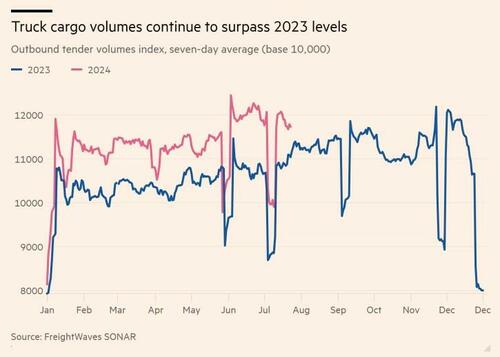It has been a long ugly road for the trucking industry in the U.S. since Covid caused one of its deepest recessions in history.
But now, it is showing "signs of life" as demand ticks higher and prices remain suppressed, according to the Financial Times. Requests for U.S. shipments increased by an average of 9% year-over-year in Q2 2024, the financial news site says.
Tender rejections, indicating carriers' willingness to accept loads, rose by 1.3% compared to the same period last year, suggesting that truckload capacity is gradually tightening, according to FreightWaves.
Bob Costello, chief economist for the American Trucking Associations told FT: “I do think the worst is behind us.”
After a pandemic-driven surge in consumer products led to a spike in trucking demand, the industry faced a "freight recession" in 2022 as inflation curbed consumer spending, reducing cargo volumes and rates.
Michael Castagnetto, president of North American surface transportation for logistics firm CH Robinson, confirmed that "rates went into freefall" in 2022.
The FT reported that the excess trucks from the pandemic boom weren't matched by demand, creating a capacity overhang still affecting companies.
For instance, US transporter JB Hunt missed earnings expectations for the fifth straight quarter on July 15, with a 24% drop in operating income compared to last year, citing underutilized assets and flat pricing as key factors for the low revenue.
On JB Hunt's earnings call, its VP of Sales and Marketing said: “We still see oversupply across all modes with shippers having options on both mode and provider to move their freight. While capacity is not a top concern right now, there is an awareness that this will change at some point.”
Now, as consumer demand steadily rises, the trucking industry is optimistic about potential rate gains in 2025, especially if interest rates decrease, according to Avery Vise of FTR Transportation Intelligence. Vise predicts a more comfortable market for carriers by mid to late next year.
However, trucking firms still face challenges, particularly with rising costs and competition. Marginal costs, excluding fuel, increased over 6% in 2023, with insurance and maintenance costs up by a third due to high interest rates, new technology, and more truck-related accidents, according to FreightWaves.
Despite these pressures, many small carriers have survived thanks to cash reserves from the pandemic freight surge, though over 25,000 firms have already exited. Small carriers, which make up over 85% of the market, have grown due to easier access to commercial licenses and digital platforms that allow drivers to find and take on freight independently.
As supply decreases and demand grows, rate improvements are expected to follow, the report concludes.
It has been a long ugly road for the trucking industry in the U.S. since Covid caused one of its deepest recessions in history.
But now, it is showing "signs of life" as demand ticks higher and prices remain suppressed, according to the Financial Times. Requests for U.S. shipments increased by an average of 9% year-over-year in Q2 2024, the financial news site says.
Tender rejections, indicating carriers' willingness to accept loads, rose by 1.3% compared to the same period last year, suggesting that truckload capacity is gradually tightening, according to FreightWaves.
Bob Costello, chief economist for the American Trucking Associations told FT: “I do think the worst is behind us.”
After a pandemic-driven surge in consumer products led to a spike in trucking demand, the industry faced a "freight recession" in 2022 as inflation curbed consumer spending, reducing cargo volumes and rates.
Michael Castagnetto, president of North American surface transportation for logistics firm CH Robinson, confirmed that "rates went into freefall" in 2022.
The FT reported that the excess trucks from the pandemic boom weren't matched by demand, creating a capacity overhang still affecting companies.
For instance, US transporter JB Hunt missed earnings expectations for the fifth straight quarter on July 15, with a 24% drop in operating income compared to last year, citing underutilized assets and flat pricing as key factors for the low revenue.
On JB Hunt's earnings call, its VP of Sales and Marketing said: “We still see oversupply across all modes with shippers having options on both mode and provider to move their freight. While capacity is not a top concern right now, there is an awareness that this will change at some point.”
Now, as consumer demand steadily rises, the trucking industry is optimistic about potential rate gains in 2025, especially if interest rates decrease, according to Avery Vise of FTR Transportation Intelligence. Vise predicts a more comfortable market for carriers by mid to late next year.
However, trucking firms still face challenges, particularly with rising costs and competition. Marginal costs, excluding fuel, increased over 6% in 2023, with insurance and maintenance costs up by a third due to high interest rates, new technology, and more truck-related accidents, according to FreightWaves.
Despite these pressures, many small carriers have survived thanks to cash reserves from the pandemic freight surge, though over 25,000 firms have already exited. Small carriers, which make up over 85% of the market, have grown due to easier access to commercial licenses and digital platforms that allow drivers to find and take on freight independently.
As supply decreases and demand grows, rate improvements are expected to follow, the report concludes.

